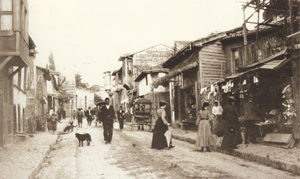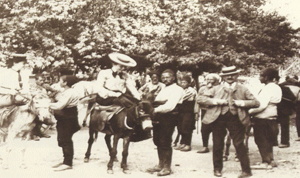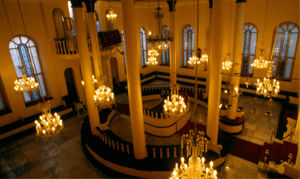Oldest Dwellers of Bursa: Jews
By Raif Kaplanoğlu
Although it is written in numerous sources that Jews had come to and settled in Istanbul and Bursa after being expelled from Spain during the reign of Ferdinard V, it is also indicated in several documents that Sultan Orhan, the second chief of the nascent Ottoman Empire, donated a channel of water to the Jew-house.
Although it is written in numerous sources that Jews had come to and settled in Istanbul and Bursa after being expelled from Spain during the reign of Ferdinard V, it is also indicated in several documents that Sultan Orhan, the second chief of the nascent Ottoman Empire, donated a channel of water to the Jew-house.

Arapsukru Street in the Jewish town.
And this shows us that Jews have actually lived in Bursa since the time of Sultan Orhan. It is documented that Jews did not leave the city of Bursa when Sultan Orhan took over that city and that Sultan Orhan, in fact, invited the Jews from nearing cities to Bursa and established a town for them.
According to some sources, there was a colony of Jews in Bursa in the year of 79 B.C. It is understood from the presence of an inscription in Zindankapi belonging to the year 580 A.D. and the mentioning of Jewish names in certain Greek inscriptions that Jews had lived in Bursa even prior to the Turks’ settlement in the region.
Sultan Orhan not only allotted a town for the Jews in Bursa in order to ensure their safety but he also let them be free in practicing their religion. For this reason, he gave permission for the building of the Efs Ehaim synagogue –the first synagogue in the Ottoman state- in what today is called Arapsukru Street in the Jewish town. Unfortunately, this oldest synagogue in Anatolia burned down in a fire in 1802 and roads have covered its ruins. Only the door of this structure remains.
‘Romanoflar’ are the Anatolian Jews, who are the oldest Jewish dwellers of the region. After the year 1492, a significant number of Jews expelled from Spain came to Bursa. These groups formed a separate community and established the ‘Gerisue’ synagogue, the name of which meant ‘those who are expelled.’ The ‘Gerisue’ synagogue is still active today. Those who came from Mayorka established the Mayor synagogue, which is also currently active.
According to a judicial file from the year 1496, a group of Jews from Bursa was moved to Istanbul. Possibly, these groups, who were invited by Fatih Sultan Mehmet to Istanbul, revived the economy in Istanbul.
There is also a Jewish bath in Bursa. When the three synagogues burned down during the big fire in 1801, their restoration was allowed by the state. The state inspected the construction of these synagogues. Additionally, there are also synagogues in Karacabey and M.Kemalpasa.
While other minorities in Bursa lived in scattered neighborhoods, it is interesting that Jews lived together in only one town, in Kurucesme. This must have been so because of the privileges Sultan Orhan gave to the town and the value Jews gave to communal solidarity.
In the south of Bursa, between Maksem and Hamzabey, there is a 160- acre recreational area called The Old Jewry. As this place is mentioned even in the journals of 1934, it is probably the oldest Jewish settlement in the area. The Jewish cemetery, though, is located in Merinos, quite distant from the Old Jewry.
The Jews were mostly living in the towns and cities of Bursa. There were not any Jews living in the villages. The most significant reason for this is, undoubtedly, the kind of work that Jews did. As artisans and merchants, Jews were not sent to the fields in the villages under Ottoman rule.

Jews have actually lived in Bursa since the time of Sultan Orhan.
THE POPULATION OF JEWS IN BURSA
The population of Jews in Bursa continuously increased over the years. In 1530, there were only 117 households in the Hudavendigar province. In 1573, this number increased to 128; in 1590 to 370; in 1594 to 403; in 1620 to 683; and in 1831 to 627.
In 1885, the total population of Jews was 2,450; in 1888 2,559; in 1890 3,000; in 1908 3,514; in 1911 4,622; and in 1914 it was 4,126. According to the French traveler Cuinet, during the 1880’s there were 73 Jews in Mihalic and 80 in Kirmasti. Around the whole city the total number was 2,704; and in the center of Bursa it was 2,548. There is also a Jewish school in Karacabey.
While other minorities left the region after the WWI, Jews remained. After the establishment of the Republic, there were 1,915 Jews living there in 1927, and 1,900 – 880 female and 1020 male- in 1935, in the city center. In M.Kemalpasa, there were 90 Jews. During these years, of the Jews living in the center, 159 were industrialists, 242 were merchants, 18 were carters, 31 were self-employed, and 10 were interested in house-maintenance. The occupations of 410 people are not clearly known. 750 Jews spoke Turkish and 355 spoke Hebrew. All of the women stated that they did not speak Turkish.
The president of the Bursa Turkish-Jewish Community Foundation, Izra Venturero, is the son of a family from M. Kemalpasa. During the early years of the Republic, his family migrated to Bursa, as other Jews did as well, because of shrinking in their communities. Today, there are only 70 Jews in Bursa.
The contribution of the Jews in Bursa to the Ottoman economy is significant. Just in the year of 1571, the amount of tax they paid was ‘26,000 akca.’ For this reason, they were always protected by the state; and the Jews likewise were thoroughly committed to the state.
Jews have lived in the area called The Jewry in Bursa for centuries and been able to practice their religious and economic freedoms in comfort. Thus, it is even observed in a judiciary record from the year 1522 that Jews in Bursa were given privileges as any trials regarding them were to take place in Istanbul instead of Bursa. Additionally, it is also understood that Jews in Bursa were not charged tariffs.
As it is seen in the articles ‘Jewish Patriotism’ (1924, Ertugrul; No.751) and ‘The Devotion of the Jewish Community’, appearing in old newspapers from Bursa, Jews had given a helping hand to the immigrants from Rumelia, and sided with the state during the war (Hudavendigar Newspaper, 1914).

Synagogue Geru_ (of the Exiled), late 15th century (Bursa)
CONTRIBUTION OF JEWS TO THE ECONOMY
Jews contributed to the Turkish society through their expertise especially in medical, technical, commercial, and diplomatic issues. For example, in the year of 1493, the first printing house in Ottoman Empire was built by Jews. During Ottoman rule, in Bursa, it was almost as though the minorities had chosen specific sectors as their occupation consciously. While the Jews would work as jewelers, tailors, and bankers; Greeks would be in the bar and restaurant business and sericulture. Muslims, on the other hand, were engaged in governing and agriculture. These diverse groups not only avoided bickering but rather complimented each other and had a relationship of mutual dependence.
It is also understood that Jews conducted important activities in Bursa Kapalicarsi since the 16th century and they were protected by the state. It is observable that they were active in the bazaar for a long time. According to a document that is from the year 1573, there was an attempt made to take away some of the stores owned by Jews because they were located near a masjid. The order of the state on this regard was that it was wrong to do such thing and that Jews could also open stores even next to the masjids. In addition to their role in managing the mint and the banks, Jews also were responsible for collecting silk taxes. In the 19th century, Jews regulated 38 of the 71 silk guilds in Bursa. A. Galanti claims that it was Jews that brought the silk industry to Bursa. And Paul Lucas, who came to Bursa in 1714, wrote about how the entire silk sector was in the hands of Jews in Bursa and Britain.
Mari Dolone came to Bursa in 1880’s and wrote his observations about the Jews in Bursa: “Cities with advanced commerce are known for their specific characteristics. A significant number of these cities are dwelled in by Jews. It is natural that in Bursa, as a city famous for its industry and commerce, an important portion of the population is Jewish. Some of the Jews are in commerce, banking, and the jewelry business. They generally engage in itinerant trade and commissions, and live in a separate town.”
As a result of their communal solidarity, they had a common cash register for the town; and as part of this tradition, wealthy Jewish families used to leave copper pots with molasses and wine by their doors for the use of the poor.
There were two Jewish schools in Bursa, and, in the 19th century, there were 150 male students. Celal Bayar, third President of Turkish Republic, also had attended Bursa Alyans Izrailit Musevi Okulu.
To exemplify the integration among the three sacred religions, there is an interesting temple in the Karacabey town of Bursa. The structure that is known as the Tumbekli Mosque is actually composed of two sections. The first section is a structure with a dome and there is a cross placed on the tip of the poles, which are by the entrance of the building. From this entrance there is gateway to another building and that is an old synagogue. In its garden, there are still Hebrew tomb inscriptions. So, this building, which carries within a synagogue and a cross, is also an active mosque today. For these special features, the Tumbekli Mosque is monument of religious tolerance.
Last modified onSaturday, 06 May 2017 10:07
Latest from Admin TOA
- World Energy Council Türkiye Holds the Opening Meeting of the Young Energy Leaders (YEL’26) Program
- The Shared Pulse by Eda Uzunkara
- NEO HUMAN 10.0: How Will the Future Be Shaped? (Filiz Dag)
- Calculatit.net Is Bringing Pricing Transparency to America’s Construction Industry
- Support Independent, Trustworthy Journalism








